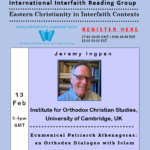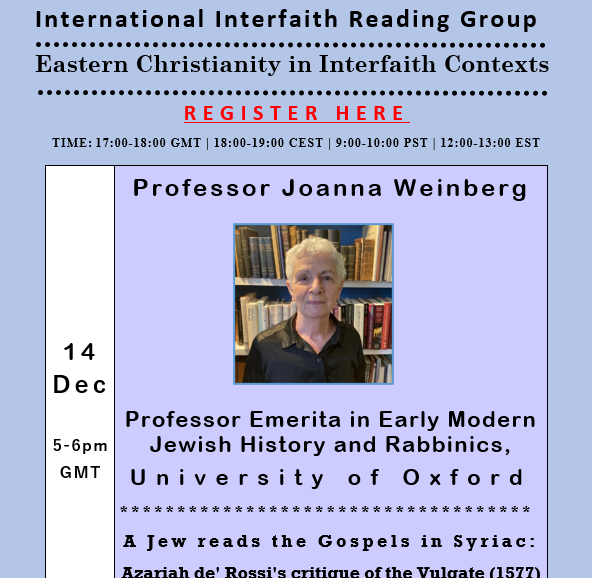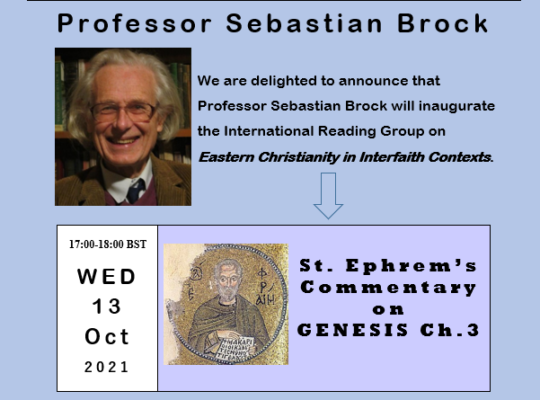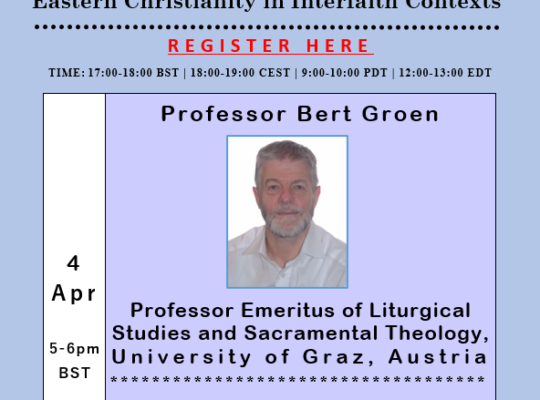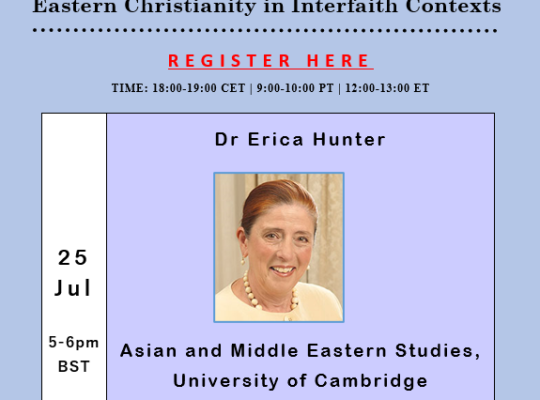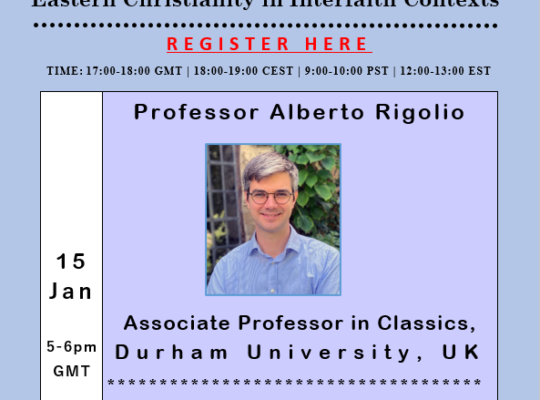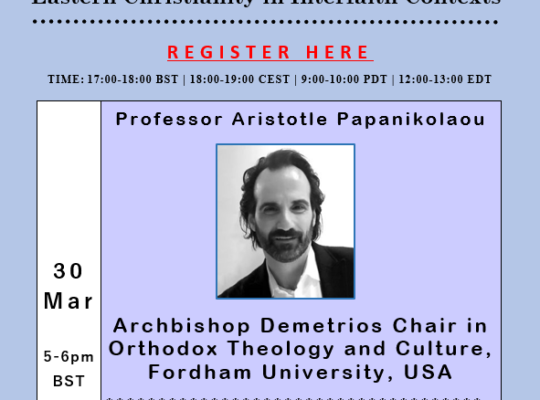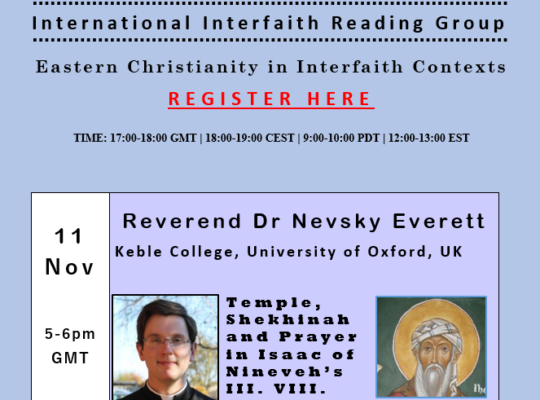14 December, 2023

We are deeply honoured to welcome Professor Joanna Weinberg, Professor Emerita in early modern Jewish history and Rabbinics, Faculty of Asian and Middle Eastern Studies, University of Oxford, to lead the Eastern Christianity in Interfaith Contexts Reading Group.
Here are the details of this fascinating event.
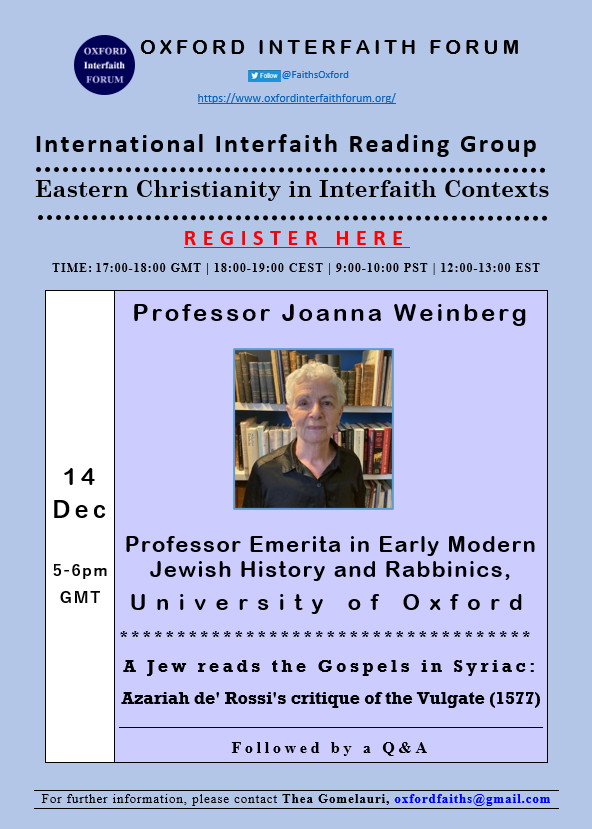
Title: A Jew reads the Gospels in Syriac: Azariah de’ Rossi’s critique of the Vulgate (1577)
Abstract: In 1577, shortly before his death, the Italian Jewish scholar Azariah de’ Rossi (1511?-1577) produced a pioneering and ambitious study on the Aramaisms in the Gospels. Written in Italian for a Christian readership, de’ Rossi set out to demonstrate that passages that had apparently become corrupt or obscure in the Vulgate, particularly those containing Aramaic expressions, could be emended or clarified by means of the ancient Syriac version (i.e. the Peshitta). De’ Rossi was one of very few scholars in the West who had tried to learn Syriac. In this session we will discuss the significance of de’ Rossi’ project and examine some examples of his learned reflections.
Speaker: Professor Joanna Weinberg, Professor Emerita in early modern Jewish history and Rabbinics, Faculty of Asian and Middle Eastern Studies, University of Oxford.
Chair: Professor Sebastian Brock, FBA, University of Oxford, UK
Date: 14 December, 2023.
Time: 17:00-18:00 GMT | 9:00-10:00 PST | 12:00-13:00 EST
Venue: Online
After registering, you will receive a Zoom email, on the day of the event, containing information about joining the meeting. If you do not see the Zoom email in your inbox, please, check your spam folder.
If you would like to join the Eastern Christianity in Interfaith Contexts Reading Group, please sign up here.
Related Sessions
- Who was Mary, the Blessed Virgin and Mother of God? A Byzantine hagiographical narrative by the ninth-century Monk Epiphanios
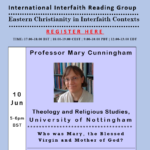
- The Manuscript Project at the Coptic Monastery of St Paul the Hermit at the Red Sea, Egypt
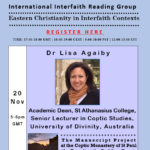
- A Jew Reads the Gospels in Syriac: Azariah de Rossi’s Critique of the Vulgate (1577)
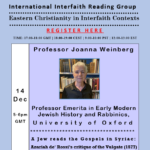
- Setting the Stage: The Rose of Performance in Studying Late Ancient Hymnody
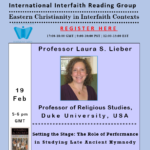
- The Miracle of Pilgrimage: A Coptic Journey to the Holy Land During the Ottoman Period
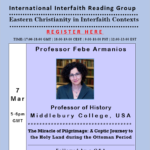
- Nikos Kazantzakis and Orthodox Christianity
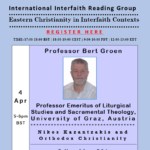
- Ephrem the Syrian and a New Beginning in Syriac Poetry
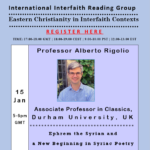
- Mary’s Ordeal: A Syriac Narrative Poem on Many and Joseph
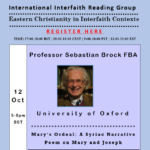
- Resurrection of the Human Body according to John of Dara’s Mimro I:4
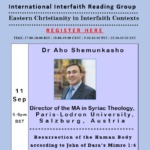
- Returning the Ticket: God and Evil in the Brothers Karamazov
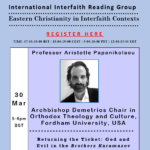
- Signs of Miraculousness: The Inimitability of Jacob of Serugh’s Teaching
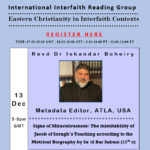
- Gregory of Nyssa: On the Human Image of God
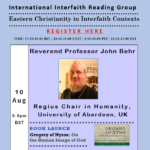
- Enoch and the Fallen Angels in the Ethiopian Tradition
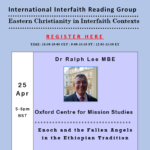
- Narsai on the Virgin Mary
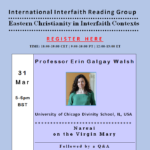
- ‘Conception by ear’ and Redemption of the Human Sensorium in Ephrem’s Thirty-fifth Madrasha on the Church
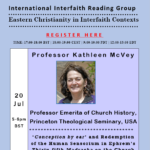
- From Edessa to South Arabia and Back: The Syriac Story of Bishop Paul and Priest John and Models of Sanctity in the Medieval Middle East
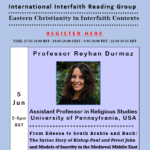
- Wrestling with Calculating-Thoughts: Mental Training according to Evagrius of Pontus
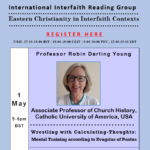
- An Anonymous Syriac Dialogue between Mary and the Angel
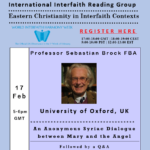
- Dadisho of Qatar: Questioning the Desert Fathers

- George the Athonite on Matters of Faith and Rite, According to the Life of St George the Hagiorite
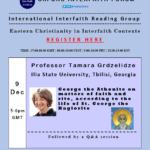
- Temple, Shekhinah and Prayer in Isaac of Nineveh’s III.VIII
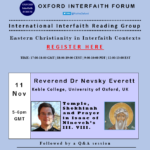
- St. Ephrem’s Commentary on Genesis Ch.3
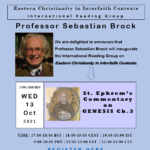
- 🕯️Alexander Schmemann on Theotokos vis-à-vis Kali a Hindu Mother Goddess
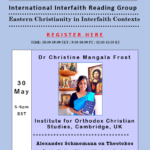
- The Opening Prayers of Saint Gregory of Narek’s Book of Lamentations
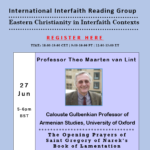
- Commemorating the saints at Turfan: Mart Shir and Mar Barshabba
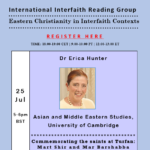
- Jacob of Sarug on the Canaanite Woman (Mt 15:21-28, Mk 7:24-30): Biblical Storytelling and Models of Faith
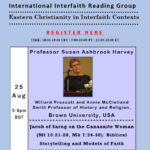
- The Paterik of the Kyivan Caves Monastery: Monk Polikarp in Discourse 14
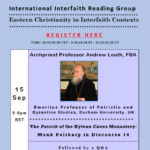
- Sarah and the Akedah: a Syriac Narrative Poem on Genesis 22
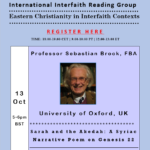
- Matta el-Meskin/Matthew the Poor: a ‘Contemporary Desert Father’ on Christian Unity
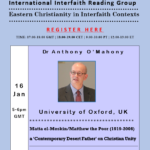
- Epistolary Style in Coptic Letters from the Late Third Century to the Early Fifth Century
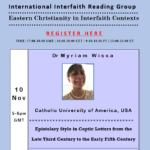
- Ecumenical Patriarch Athenagoras: an Orthodox Dialogue with Islam
